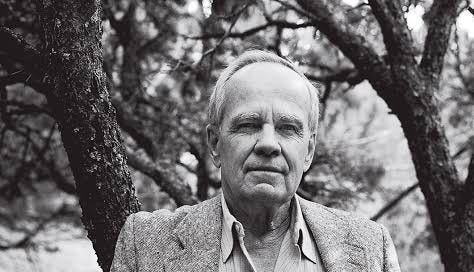How would you react if all your artistic dreams came true? Would you DM all your hot followers on Instagram? Would you buy a new car? Would you do more readings, workshops, and events or less?
Growth, revelation, and oneness occur on the journey, but imagining your end goal is a common tactic in personal development literature. What did Cormac imagine when he was writing his first three crazy novels? When you can’t afford toothpaste and your first two books sold 2,000 copies, is writing about a necrophiliac a great idea?
One thing a lot of artistic dreamers forget is that accomplishing their dreams will do nothing for them. I know plenty of men with no special attributes who date very beautiful women. There are easier ways to make money than being a fiction writer. You could start a below-average YouTube channel and speak to more people every day about your writing or books than any small venue could hold.
So, what is the real dream?
Cormac was not scared to talk to random people, travel, and be a very social member of a community (Santa Fe Institute.) But, his reluctance to talk about his work relates to his reluctance to believe in language. In Whales and Men, McCarthy writes,
“What gradually became apparent to me was that language was a thing corrupted by its own success. What had begun as a system for identifying and organizing the phenomena of the world had become a system for replacing those phenomena. For replacing the world. Language was like the evil aliens in the horror movie that take on the forms of things and gradually replace them altogether. Only no one knows. They look like the thing but they are not the thing. Language usurps things. That is what it does. More and more I began to understand that we were not living in the world as given. We no longer even knew what it was. When you say apple I hear the word and I see the letters A P P L E and you say no, the real apple, and I go: Ah, yes. Of course. Red. Juice. Sweet. What we live in is a linguistic model of the world. We have no way of even knowing what’s been lost.
Cormac in “Whales and Men” and the “Kekule Problem” attacks his entire world. This coincides with him getting heavily involved with scientists and most likely feeling inferior. Up until 1980 McCarthy didn’t have a problem talking about this work and did 10+ interviews with local papers. But, as soon as he got some money and scientific friends his lips on literature stayed sealed.
I have a bunch of other theories, but I will let some of you guys fill in the blanks.
Why did Cormac never talk about his writing?




I am not convinced he loved writing, at least not over the last fifteen to twenty years of his life. Didn't he mention in some interview how writing was further down the list of activities he enjoyed? I have been an actor in Canada since I was 30 and I am now 60. People often assume I want to talk about the roles and the different celebrities I have worked with, but I don't. I have no interest. It is only a job. Cormac is my favourite author. I love almost everything he has written and sometimes I get caught up in the myth of Cormac. We're drawn wanting to know as much about this quiet reclusive guy as we can. The fact that he preferred the company of science-minded folk over writers speaks volumes as to why he didn't speak volumes about his craft.
Yes absolutely - a sense of duty.
I'm really enjoying your thoughts and this thread, Ian. There isn't anyone in my orbit who appreciates Cormac and his work the way people like you and I do. This is great. Keep'm coming, brother.
I'd love a TV mini series on Suttree. I think only the Brits could pull it off. They seem to make the best television.